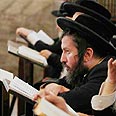
Archive
צילום: חיים צח
Avinu Malkeinu
Rabbi Akivah was first one to pray 'Avinu Malkeinu' combination. The result was bountiful rain
One of the most well-known tefillot of the Davening on Yamim Noraim is the prayer of Avinu Malkaynu. I would like to share with you some very interesting aspects about Avinu Malkaynu, which will hopefully enrich your experience when you recite it.
- To listen to the Dvar Torah click here
It’s origin is described in the Talmud, Taanit 25b, where it teaches that during a terrible drought in Israel, a fast was proclaimed and special public prayers were recited. No rain. Rabbi Eliezer then recited a unique 24-blessing Amidah that was formulated for such occasions, and still no rain fell.
His disciple Rabbi Akivah then stepped forward with a five-sentence prayer, with each line beginning with Avinu Malkaynu. The heavens responded immediately with ample rain. Since then, we have used this formula on fast days and special occasions, as a way to attract the magnanimous mercies and compassion of Hashem.
Why not on Shabbat?
Many wonder why it is not recited on Shabbat, except during Neilah at the conclusion of Yom Kippur. One reason is because many of the requests in the full version of Avinu Malkayni, are patterned after the weekday Amida. Also, it is similar to the weekday Tachnun. And, it was originally recited on a public fast day, not on Shabbat.
Regarding the first line of Avinu Malkaynu Chatanu Lefanecha, the Zohar teaches that it should really be omitted, being that confession of our sins in not part of the motif of Rosh Hashanah. The main motif of Rosh Hashanah is crowning Hashem as our King, and that we find in the second line, Avinu Malkaynu, ain lanu melech elah atah, we have no king except you.
One might think that if we don’t follow the Zohar and actually say the first line, Chatanu lefanecha, that perhaps we should beat our chest at the word Chatanu, just as we would for the individual confessions of Ashamnu on Yom Kippur. However, Chazal, our sages, remind us that we refrain for doing this. Customs may differ, of course, from shul to shul.
Even not one mitzvah?
At the very end of Avinu Malkaynu, we find the last line which has a very famous melody. In every shul, it is likely sung in the same plaintive and sincere melody that it has been sung over the ages.
Our father, our king, be gracious with us and answer us, chanaynu vanaynu, and then we say something which, upon reflection, may sound like a strange admission, and even more, might be untrue. We say in this last line, please Hashem show us kindness because we are terribly undeserving, and the words we use are, ki ain banu maasim, which literally means, we have no deeds.
I draw attention to this, because I ask the question, is it possible to find a Jew who has no deeds to represent him or her in heaven? Is there a Jewish person who doesn’t even have one mitzvah? We’re not speaking about one hour or one day - in this case, much to our regret there are Jews who can pass an entire day, perhaps even several days, without consciously performing a single mitzvah.
But en entire year to go by without a single mitzvah? That is a very harsh self-indictment on such a holy day, a day given for honest assessment. Surely every Jew has done something, said something, even thought something during the past year that can be considered a good deed. Why would we say, we have no deeds?
One answer could be, that on this day of Rosh Hashanah, we stand stripped of all pretenses, and perhaps feel, in the scheme of what we could have done, it feels as though we did nothing. We have no deeds could be our way of saying; we haven’t even scratched the surface of our full potential.
Another answer is, the word banu means in us, within us. Sure, we’ve done many miztvot, many good deeds and rituals, followed many halachot and laws. But they weren’t banu, within us, we didn’t internalize the mitzvah or its message. We did mitzvot by rote, in a perfunctory manner, without passion or depth. In this sense, we had maasim, deeds, but they weren’t banu, deep from within.
May the recitation of Avinu malkaynu open the gates of heaven for a shana tova, a gut gebentcht yohr.
Rabbi Elan Adler is the rabbi of Moses Montefiore Anshe Emunah Congregation of Baltimore, MD.
Courtesy of the Orthodox Union Take Five for Torah program










